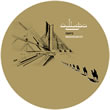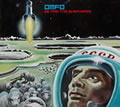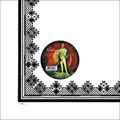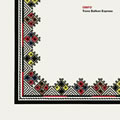Ahilea feat. Bella Wagner -
Devil's Eyes
Amsterdam Klezmer Band
>Mokum
>Katla
>Zaraza
>Remixed
Baba Zula - Gecekondu
Baile Funk
>Baile 1
>Baile 2
Balkan Beat Box
Binder Krieglstein
>New Weird Austria
>Alles Verloren
Boom Pam
>Puerto Rican Nights
>Boom Pam
Jewrhythmics
>Jewrhythmics
>Misirlou e.p. - vinyl
Mi Loco Tango
>Cinema Paradiso
>Del diablo y del Angel
OMFO
>Omnipresence
>Baghdub - vinyl
>We Are the Shepherds
>Transbalkan Express
Señor Coconut
>El Baile Aleman
>Fiesta Songs
>Around the World
>Yellow Fever
>Behind the Mask - vinyl
Shantel
>Kosher Nostra
>Authentic
>Planet Paprika
>The Edge of Heaven
>Disko Partizani
>Bucovina Club 1
>Bucovina Club 2
Rotfront
>Visa Free
>Emigrantski Raggamuffin
Tobias Rüger Quartet
Ilija Trojanow
Vesna A New One
MUSIC

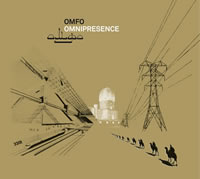
CD RELEASE
OMFO
Omnipresence
Essay Recordings AY CD 22
Music from Omfostan Omnipresence is the opus magnum of the explorer and discoverer OMFO. Years of travelling far and wide, making hundreds of recordings, delving into ancient musical cultures, learning to play strange and unfamiliar instruments, have culminated in this experimental electro-acoustic masterpiece. An unprecedented combination of sound and instruments takes us on a journey through time and space, captivating the imagination from the very first moment.
His first album on the Essay Recordings label, Trans Balkan Express, put OMFO in the international spotlight. Sacha Baron Cohen (aka Borat) even chose two tracks from the album for the soundtrack of his latest film. On his second album, We are the Shepherds, OMFO led a virtual flock of sheep into orbit and let the shepherds make music in zero gravity.
After that, he concentrated on developing his stage performance according his maxim of “back to the archetypes”. Collaborating with artists and musicians from around Eurasia is his greatest passion; traditional cultures and their connection with cosmic metaphysical forces his greatest inspiration. OMFO wants to introduce western audiences to what he regards as the “intrinsic modernism of the Orient”. This includes extending the listener’s experience of music beyond the boundaries of mere entertainment and taking it into the realms of ritual.
His Primitive Equations project, with DJ Goldfinger – a series of events featuring the music and art of indigenous people – uses “field recordings” accompanied by video projections of related images. In October 2007, thanks to the Aga Khan Music Initiative in Central Asia, OMFO was able to visit Tajikistan, where he had the opportunity of working directly with musicians from the remote Pamir mountain region of Badakhshan. This led to a series of multimedia events throughout Europe and Central Asia: Falak - the Heavenly Music on Stage. It is from this wealth of experience that OMFO has drawn the inspiration for his latest album. In his quest to resolve the issue of traditional cultures and their role in the age of technologies, Omnipresence is a catalyst for the fusion of these two seemingly irreconcilable concepts. At the same time, OMFO continues to work in the field of film music, mainly creating soundtracks for the video installations and performances of leading Kazakhstan artist Almagul Menlibayeva, whose work will been shown again at the Venice Biennale this year.
Expeditions into Central Asian Dub Space
OMFO’s reflections on his new album
It all started in a chaikhana somewhere in Central Asia. As I was enjoying a bowl of tea, suddenly the east of my brain started to send strange signals to my body. And then my vision of the world turned into the abstract motif of a Turkmen rug. The whole universe transformed into a carpet ornament. The sound of prayer calls, noisy bazaars and barking dogs dissolved into the eerie desert wind.
The next moment I found myself sitting on the back of a camel. Our long caravan was drifting through a bright yellow space, toward an invisible horizon, where sand dunes and sky merge. Where we came from, what we were, and where we went, nobody could tell. No-one spoke a word. We were in a dreamlike state.
Suddenly, one of the camels started to sing and soon the whole caravan was humming along. With a sudden jerk, the western part of my brain hurled me back into the tea house. The beautiful song I had just heard slowly faded away.
I took another sip of tea and when I looked up, I saw a mountain range flashing by. I was on the bullet train to Dushanbe. Next to me was a girl with eyebrows curved like the crescent moon, and a little birth mark on her cheek. Her sensuous eyes radiated love and she smiled mysteriously while listening to her turquoise iPod. On the small display I saw the secret of her joy: she was listening to OMFO.
Just as I was about to say something to her, the train stopped in the middle of nowhere. When I got off the train, I saw a long carpet that leads me to a richly decorated yurt. It was as though I was expected there. A group of nomads dressed in colorful chapans offered me a bowl of fresh kumis. Their vintage Russian world receiver played some mellow Pamiri Dub, and a few electronic arabesques, until it broke down. The horse milk had made me very tipsy and just like a djinn, I flew straight to the Pamiri Mountains. I landed in a deserted kishlak, where I was welcomed by an almasti. Soon a whole family of these six feet tall bigfoots joined us in some Neolithic ritual. We were chanting some abracadabra and as we were circling around a huge tree, going faster and faster, we heard the sound of thunder. A bolt of lightning struck the tree, and from its center a Siberian shaman appeared. While beating his drum he invoked the spirits of my innumerable ancestors. In a split second I realized that I was able to go wherever I wanted to, at the speed of my wish. The drumming transformed into countless songs and melodies that spread through my vast brain like a blazing fire - Music! Incredible music filled the whole universe! Omnipresence!
PER ASPERA AD ASTRA
Glossary
Chaikhana – Central Asian tea house
Chapan – Central Asian caftan
Yurt – nomadic tent
Kumis – horse milk
Kishlak – settlement, village
Almasti – terrible snow man (Yeti)
TRACKLIST
01. Tipsy Djinn
02. Sindbad the Spaceman
03. The Sorcerer
04. Expedition East
05. Pamiri Dub
06. Baghdub
07. Arabesque
08. Windhorse
09. Tajik Equations
10. The Lost Polyphonics
11. Pagansonic
12. Caravanserai
13. Siberian Abracadabra
14. Almasti
15. Kashgar Chai
16. Beauty Mark
17. Native Nocturne
18. Opium
19. Omnipresence
OMFO - Biography
OMFO is German Popov's stage name. He was born in 1966 in the port city of Odessa, USSR. Growing up in the biggest country in the world and being brainwashed by communist propaganda he proudly marched through the glory and misery of Soviet reality until all this came to an end. Unable to endure the pain inflicted by Perestroika G. Popov headed for the west, arriving in multicultural Amsterdam - a city associated with tolerant cannabis policy and frivolous behaviour. That was where G. Popov rediscovered the rich cultural inheritance that was left to him by the past. Utopian ideology, the moral and cultural decay of the Brezhnev era, the pathos of space exploration and ethnic diversity: all this made him ready to become OMFO. G. Popov began his musical career playing gangster ballads and prison epics in caviar restaurants and fugitive hangouts together with Alec Kopyt. Taking advantage of world music lovers they played under the name The Children of Lieutenant Schmidt. After a while when this became no longer tenable G. Popov shifted his focus of interest towards space and cosmonauts. Jointly with a group of Soviet expatriates he created a band called Sputnik. Noticed by the adepts of electronic extravaganza Sputnik soon released their only album The Favorite Songs of Soviet Cosmonauts. While the band was beeping around glamorous clubs and private parties G. Popov explored another musical path - folklore. During one of his solo performances he was approached by a producer of a major Dutch new age label, who offered him his studio to make a recording. Shortly after, Oreade Music released an album under the mysterious name Isiric. To G. Popov's surprise this work was classified by the label as Worlds Healing Music. In contradiction to this classification, the album continues to inspire young intellectuals to experiment with psychedelic substances all over the former USSR. The secret of its popularity hides behind the Russian lyrics of exotic Siberian and Central Asian melodies, skilfully played on weird instruments and sung with quaint vocal techniques. Probably this was when G. Popov fully realized the inseparable unity of ethnic wisdom and electronics as a true folklore of the 21st century.
As the Nineties were wrapping up their legacy OMFO focused on his solo project Our Man from Odessa, collaborating with various electronic labels. Most of his early works were released on the small Dutch label Kidnap, founded and run by members of the ex-Soviet diaspora. During this period he also collaborated with a controversial diva from the remote republic of Tuva – Sainkho Namchilak - travelling the world and playing at big international venues.
As the new millennium kicked in, G. Popov and his friends found a new platform for their futuristic vision of sound and music. This is how Solaris was born. Presented not as record label, but as an art lab, this project was clearly inspired by Russian constructivism and utopian romanticism. The glamorous alias Our Man from Odessa gradually turns into the more succinct and enigmatic OMFO. During this period, OMFO comes into creative contact with projects and artists such as Metamatics, Aavikoo, Jimpster, CiM and Felix Kubin. All these names appeared on Solaris' releases such as Aelita, Cheap Electric Paradise and Omnipresence. Music distributors and record shop owners still treat these impeccably designed albums as collector's items. A few years ago OMFO was contacted by Vladimir Lomberg – a like-minded person who was invisibly present behind various projects including Solaris and Kidnap. He put OMFO in touch with Essay Recordings - a record label that is exploring the hidden potential of Eastern European music. OMFO's works began with a successful remix of a track written by Shantel – the man who pioneered the fusion of Balkan music with electronic beats. After the remix was included in the internationally acclaimed Bucovina Club album, OMFO was commissioned by Essay to work on his new album. Responding to the demand for something new in this field, OMFO created Trans Balkan Express. Shortly after its release this album became popular throughout Europe and beyond, scoring hits; it was played on the radio and covered by the mass media. Experimenting with fresh concepts and ideas, OMFO immediately distanced himself from the rest of the producers working in this genre. The peculiar and somewhat humorous vision of a Carpathian villager, playing a native tune on an analogue synthesizer, made OMFO's music natural and accessible for people from all walks of life and religious or ethnic backgrounds. Only this quality could attract an audience that includes criminals, shepherds, astronomers as well as taxi drivers and even terrorists. Regardless of the simplicity of the album, many music critics hailed Trans Balkan Express as cutting edge. The songs from Trans Balkan Express were licensed by other labels and included in various compilations. It also came to the attention of famous comedian Sasha Baron Cohen better known as Ali G. Two tracks from OMFO's album are about to be featured in the new 20th Century Fox film production Borat's Guide to America.
Due to its very strong Arabic influence, one track called Bagdub was not included on the album. It was released by Dorfmeister's G-Stone Recordings, becoming one of the most outstanding tracks of the "Dub Club"compilation. Last spring G. Popov was introduced to Uwe Schmidt himself, who is also know under the alias of Atom™or Señor Coconut. The Sound Wizard kindly agreed to participate in the production of the new OMFO's album. Separated by the Atlantic Ocean but united by a common goal, the two men started to exchange midi and audio files, to manipulate sounds, pushing to the limits of their software and hardware. As a result of their efforts, the album was ready within one month! Under the name We are the Shepherds, this project became the logical continuation of the previous Trans Balkan Express. The ironic reference to Kraftwerk in both titles was intended to underline the electronic concept of music.
To promote his projects, OMFO put together a line-up of five extraordinary people: the Transylvanian gypsy wunderkind Vasil Nedea on cimbalom and accordion, the Azeri sci-fi writer and virtuoso Rassul Kazimov on tar and guitar, the freedom fighter and storyteller Bakhtiyar Eybaliyev as percussionist and singer, often compared to a nightingale, and Fay Lovsky, The Lady from Beyond, who plays extremely rare instruments such as theremin and the singing saw, adding an eerie and mysterious mood to the music. All these musicians took part in the recording of We are the Shepherds.
The spectrum of OMFO's works is wide. He produces soundtracks for adult video clips and composes jingles for Turkmen radio stations. For the Venice biennale he wrote the soundtrack for the first ever Central Asian pavilion. Also, OMFO gives solo concerts and performs as a sound artist, as well as collecting field recordings. One of the new forms of using sound by OMFO is creation of a "sonic horoscopes"which are a peculiar way of linking astrology and music. In order to able to present his musical ideas avoiding European stereotypes he is constantly searching for the right venues and conditions to present his music to the audience. This brings OMFO in interaction with art galleries, theatres, cinemas, planetariums and botanical gardens.

